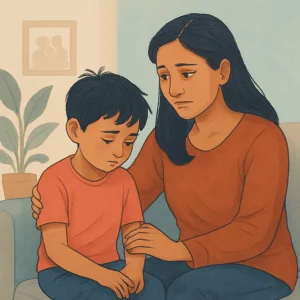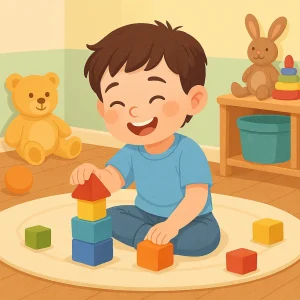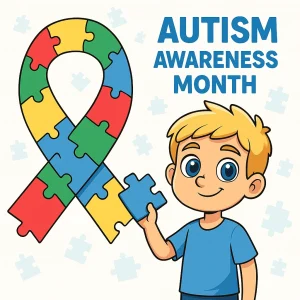Why Do Some Kids Struggle With Fast and Unclear Speech?
Last Updated: April 9, 2025
Unclear speech in children is a common concern among parents and educators. When kids speak too fast or mumble their words, it can be difficult to understand them, affecting their communication, confidence, and social development.
So, why do some kids struggle with fast and unclear speech? The reasons can vary. Some children may experience speech delays, motor coordination issues, or hearing problems. Others may pick up rushed speech patterns from their environment or speak quickly due to excitement or anxiety.
Understanding the root causes early is key. Speech clarity is more than just pronunciation—it’s about helping children express themselves clearly and confidently. Early intervention and the right support can make a big difference in your child’s development.
In this guide, we’ll explain the common causes of unclear speech in children, signs to watch for, and simple, effective strategies parents can use at home to support clearer communication.
Not sure where to start? Book a free speech therapy consultation and speak with an expert today.
Common Causes of Fast and Unclear Speech in Kids
Developmental Factors Affecting Speech Clarity
- Speech Development Process: Speech unfolds over several years, starting with babbling in infancy to forming words and sentences.
- Delays and Atypical Patterns: Some children may experience delays in speech or atypical development affecting clarity.
- Motor Skill Difficulties: Challenges with motor skills required for speech, like controlling the tongue and lips, can cause rushed or slurred speech.
- Hearing Issues: Undetected early hearing problems can prevent children from hearing and replicating sounds correctly.
- Importance of Early Intervention: Using resources like Wellness Hub for early detection and intervention can help improve speech development.
Environmental Influences on Speech Patterns
- Impact of Surroundings: Noisy environments may lead children to speak louder or faster to be heard.
- Behavior Mimicking: Children often mimic the speech patterns of those around them, including fast speaking if common in their environment.
- Language Interaction: Limited exposure to rich language interactions, like reading and storytelling, can impede clear articulation.
- Promoting Clear Communication: Creating environments that encourage clear and calm communication can improve speech clarity.
Psychological Aspects of Fast Speech
- Anxiety and Speech: Anxiety can make children rush their speech to relieve discomfort or out of fear of losing the chance to speak.
- Excitement Influences: Excitement can cause children to speak quickly as they try to express their thoughts rapidly.
- Managing Emotions: Helping children manage their emotions can lead to clearer and more deliberate speech patterns.
Effective Strategies to Help Children with Unclear Speech
Speech Therapy Techniques for Clarity
Speech therapy offers a range of techniques specifically designed to improve speech clarity. These methods focus on slowing down speech and enhancing articulation, which can significantly benefit children who struggle with fast and unclear speech.
- Pacing Techniques: Therapists often use pacing boards or visual aids to teach children how to slow their speech rate. This method encourages taking pauses at appropriate intervals, helping to clarify their spoken words.
- Articulation Exercises: These exercises help children learn how to pronounce sounds clearly. Therapists might use tongue twisters, repetitive practice of challenging sounds, and targeted games to make these sessions enjoyable and effective.
- Phonological Awareness: Enhancing a child’s awareness of sound patterns in words can improve their pronunciation skills. Activities may include rhyming games, segmenting sounds, and blending exercises.
- Modeling: Speech therapists model correct pronunciation and slow speech patterns during sessions, providing a clear example for children to emulate.
Read More : Improve Child Speech Clarity: Tips, Games & Milestones
Parental Guidance and Home Practices
Parents play a crucial role in reinforcing what children learn in therapy. Here are some tips for parents to encourage clear speech at home:
- Daily Reading: Spend time reading aloud with your child every day. Encourage them to read along and discuss the story to practice clear articulation of words.
- Conversation Time: Dedicate specific times for detailed conversations where the child practices speaking slowly and clearly. Correct gently and praise often.
- Record and Playback: Record your child speaking and play it back. This allows them to hear their speech and understand areas needing improvement.
- Speech-Friendly Home Environment: Create a calm environment that encourages slow and clear speech, avoiding situations that might rush them.
Respecting and Understanding Cultural Speech Norms
Cultural norms significantly influence how speech is perceived and understood. Different cultures have various expectations regarding speech speed, clarity, and enunciation, which can affect how speech clarity is taught and valued.
- Cultural Variations: Some cultures prioritize direct and concise speech, while others may use a more indirect and elaborate communication style. Recognizing and respecting these cultural differences is crucial in a globalized world.
- Speech Adaptation: In multicultural and diverse educational settings, it is important for educators and speech therapists to adapt their methods to accommodate and respect cultural speech norms. This adaptation helps in effectively addressing speech clarity issues without disregarding cultural identities.
- Inclusive Practices: Incorporating culturally responsive practices in speech therapy and education not only respects cultural diversity but also enhances the effectiveness of communication strategies taught to children.
How Wellness Hub Supports Speech Clarity
At Wellness Hub, we are dedicated to empowering parents, educators, and therapists with the tools they need to support children’s speech and language development. Our mission is clear: to enhance the effectiveness of speech therapy and education through innovative, accessible resources that make learning enjoyable and comprehensive for children across various needs.
Tools and Resources for Speech Therapy
Wellness Hub offers a wide range of tools and resources designed specifically to aid in improving speech clarity:
- Interactive Speech Therapy Apps: These apps are designed to make speech practice engaging and fun, featuring games and activities that focus on phonetics, articulation, and vocabulary building.
- Printable Worksheets: Tailored to different ages and needs, these worksheets provide practice exercises that help reinforce daily lessons and improve speech clarity.
- Online Courses: We offer courses for parents and educators to learn more about speech development and therapy techniques, empowering them to support their children more effectively.
- Customizable Learning Plans: Understanding that every child’s needs are unique, our learning plans can be customized to suit individual speech therapy goals, ensuring the best possible outcomes.
Empower your child’s growth at home with our expert-designed home therapy resources. From speech to social skills, explore tools that make learning fun and effective.
Conclusion
In conclusion, tackling fast and unclear speech in kids is key for their growth and self-confidence. At wellness hub, we offer tools and resources like interactive apps and engaging worksheets that make speech therapy fun and effective. Our success stories, from children and therapists alike, show the real changes we bring to families. We’re dedicated to helping every child express themselves clearly. Discover more about how we support speech clarity on our resources page.
Frequently Asked Questions:
1. What causes unclear speech in children?
Unclear speech in kids can stem from several factors, including developmental delays where children don’t acquire speech skills as expected, environmental factors such as insufficient language-rich interactions, or emotional conditions like anxiety which may cause kids to rush through their words. Understanding these causes can help in addressing them effectively.
2. How can I tell if my child’s speech is unclear?
You might notice your child’s speech is unclear if they struggle to pronounce words like their peers, speak unusually fast or choppy, or if listeners often ask them to repeat themselves. Regular communication and observing how others interact with your child can help identify if there’s an issue.
3. At what age should I be concerned about my child’s unclear speech?
Most children develop key speech and language skills as they grow, but if your child is behind peers by the age of 3 to 4 years in clear speech, it might be time to consult a speech-language pathologist to assess any underlying issues.
4. Can speech therapy help my child speak more clearly?
Absolutely, speech therapy is highly effective in improving speech clarity. Speech-language pathologists use tailored exercises and techniques that focus on slowing down speech, improving articulation, and strengthening the muscles used in speech, which are essential for clear communication.
5. What are some simple activities to improve speech clarity at home?
Simple and engaging activities like reading books aloud, playing pronunciation games, and encouraging your child to narrate stories or daily activities can significantly enhance speech clarity. These activities not only improve pronunciation but also boost confidence in speaking.
6. Are there any tools from Wellness Hub that can help with my child’s speech?
Yes, Wellness Hub offers various interactive tools and resources designed for children’s speech improvement. These include speech therapy apps that turn learning into a fun activity, as well as printable worksheets that provide practice with articulation and phonetics.
7. How long does it typically take to see improvement in speech clarity?
The time it takes to see improvement in speech clarity can vary based on the child’s initial challenges and the consistency of practice. However, with regular and structured practice, many parents notice improvements within a few months.
8. What should I do if I suspect my child has a speech disorder?
If you suspect a speech disorder, it’s important to seek an evaluation from a qualified speech-language pathologist. They can diagnose the specific nature of the speech issue and recommend appropriate therapies or interventions tailored to your child’s needs.
9. How can I support my child’s speech therapy at home?
Supporting speech therapy at home involves creating a supportive environment that encourages practice. Reinforce the techniques used during therapy sessions, engage in speech-enhancing activities together, and ensure your child has access to recommended resources like those from Wellness Hub.
10. Can multilingual environments affect speech clarity?
Yes, growing up in a multilingual environment can sometimes impact speech clarity as children may mix elements of different languages. However, this is often temporary and can be managed by providing clear, consistent exposure to each language separately to help distinguish and master them.
About the Author:
Shilpa Deshpande
Shilpa Deshpande is a skilled speech-language pathologist with over 14 years of experience. Fluent in Kannada, Telugu, Hindi, and English, she specializes in parent counseling, speech sound disorders, fluency assessment, and speech-language evaluations. Shilpa excels at working with children with developmental disorders, offering creative and effective therapy programs. Currently, at Wellness Hub, she holds a BASLP degree and is registered with the RCI. Her patience, ambition, and dedication make her a trusted expert in her field.
Book your Free Consultation Today
Parent/Caregiver Info:
Client’s Details:
* Error Message









